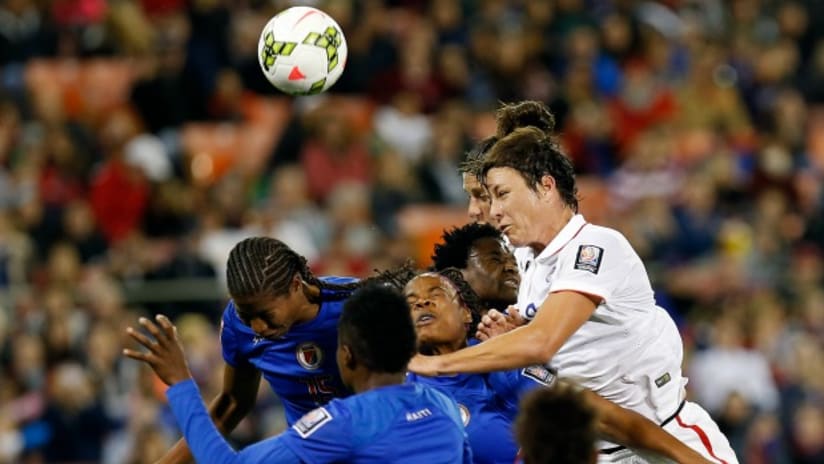WASHINGTON -- For 90 minutes on Monday evening, the US women’s national team attacked. And for 90 minutes, their opponents from Haiti had nearly every one of their players behind the ball.
The Haitian team -- a group comprised almost entirely of amateur players -- entered the CONCACAF Women's Championship tournament match knowing that getting any sort of result against the US was a long shot at best. Their technique -- bunkering nine or ten players behind the ball and hoping for the occasional counterattack -- was the same one employed by Trinidad and Tobago and Guatemala in the US' previous two group stage matches.
The Americans seemed to have little trouble breaking down the Haitian defense in the 6-0 win, peppering Haiti ‘keeper Geralda Saintilus with 12 shots on goal and finding the back of the net on six occasions. After the match, however, much of the focus amongst US head coach Jill Ellis and her group wasn’t on the scoreline, it was on the difficult task of measuring progress against such an tight defensive setup.
"Often times after tournaments like this you might want to stick all the tapes in a box and send them off somewhere,” said USWNT striker Abby Wambach, "because this is not indicative of the team that we are. You have to change based on the teams you play against, the formations and the systems that they run against you.
"In practice, when we do 11-a-side, it’s two of the best teams in the world going at each other for 90 minutes,” she added. "It’s actually really fun soccer to watch. And so from a spectator point of view I feel bad because I want people to enjoy what they see -- but I can understand from [Haiti’s] perspective they don’t want to lose 13-0.”
Though the US had their share of opportunities, their movement was far from fluid, a byproduct of having to thread passes through a congested box and having to deal with extra defenders.
"It’s a unique situation in CONCACAF,” Ellis said after the match. "Teams really do put a lot of numbers behind the ball and certain teams that are more athletic really do make it more challenging for us. I don’t think this is something we’ll see regularly.
"I mean certainly the result as far as the win is important, but we’re talking a lot about our performance, we’re measuring that. We lowered our unforced errors from the first to the second game. So we have measurables and we can assess ourselves on not just the scoreline.”
"It’s a work in progress," added Wambach. "I feel like as soon as we figure out how to play against some of these teams that sit back and bunker against us, we’re going to be out of this tournament. It’s very important that we keep challenging ourselves no matter who we’re playing. "
With the group stage out of the way, the US will move into the elimination phase of the tournament, where their opponents really won’t have a choice but to go for goals. With the possibility of a draw eliminated, the teams they face will have to open the game up and hope to put one past the top ranked women’s team on the planet. “I’m sure we’ll see stretches of this,” said Ellis, “but at some point it’s going to be an open-up game."
"It’s funny, because just talking on the bench after I came off, [I told my teammates] 'it doesn’t even look pretty.'" Wambach concluded before strolling down the tunnel to the team bus. "I think that’s really important for us to realize and understand, that this isn’t going to be the way that we play, because it’s so far off-base, the way that these teams are defending against us is so different than what we’re used to."













